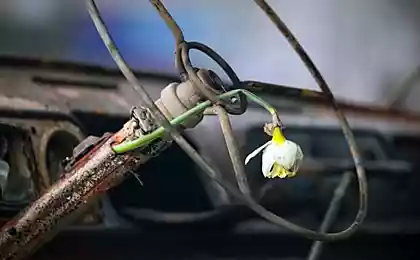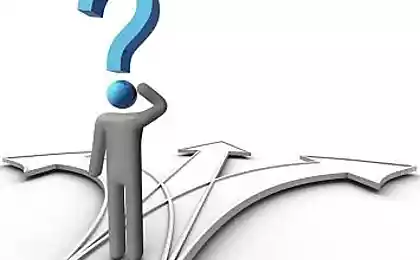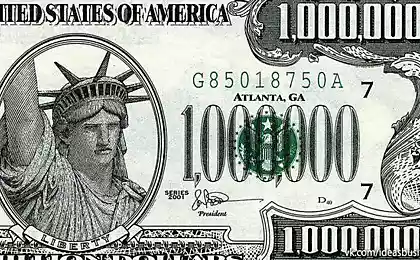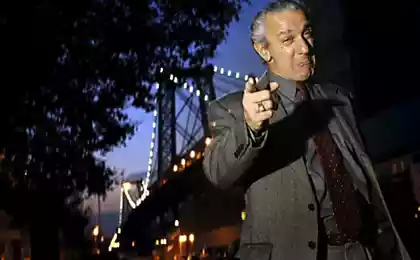682
Steal a Million
Corruption has become a fast and efficient way to enter the elite
Budget money goes to the left. And more and more. If even five years ago, corrupt officials stole from the state budget to 50% of public funds, now has assigned 80%. Such data are made public at a recent board of the Main Department of Internal Affairs in St. Petersburg and the Leningrad region Head of economic security and anti-corruption department of the Mikhail Ilyin.
This statement caused a strong reaction in law enforcement. True, not the one on which he could rely.
source
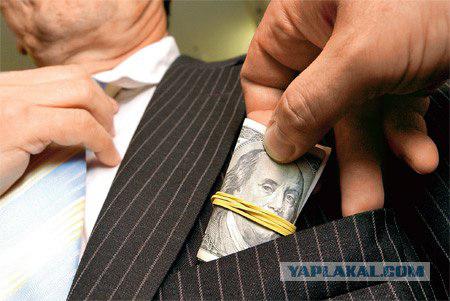
Ilyin was almost immediately suspended from duties. While temporary, with the words "leave of absence". Moreover, it is in this position less than six months. As told "SP" colleagues Ilyin, "all data is correct, tested more than once, just to talk about them was impossible without coordination with Smolny».
In Smolny also responded, but peculiar: tightly disabling for some time, all telephones officials - at least for the press. Attempts by the correspondent of "joint venture" for comment, in particular, the leadership of the Committee on Investments and Strategic Projects and Construction Committee for several days consistently met with a polite but firm "No one!" Secretary of the head of these departments of the city administration. < br />
"Specifically, this figure - 80% named high-ranking law enforcement officer at the beginning, of course, shocking, but actually operated it many known facts - said on this occasion Anatoly Krivenchenko, deputy of the Legislative Assembly of St. Petersburg of the faction" Fair Russia ". - They are just silent. I can give you examples - building the world's most expensive stadium on Krestovsky Island, which was completed in 2009 but has not yet been completed; KAD building another branch. "
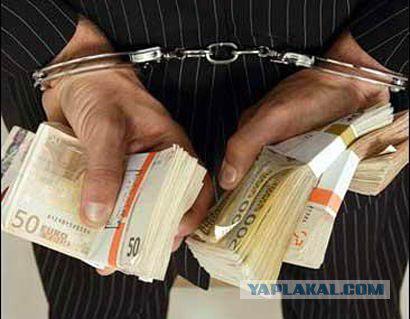
With deputy According to experts, complementing the "bribe list" of road maintenance, the organization of mass events and numerous targeted targeted programs.
- Corruption has become systemic, - Alexander Duka, candidate of political sciences, head of the sociology of government and civil society Sociological Institute of Russian Academy of Sciences. - Kickbacks, inflated prices - has long been almost the norm for officials and those who are with them. Without it they can not, because corruption is the fastest and most efficient way to acquire a certain social status and wealth. This - at first. Second, it unites power groups, it is well known: the robbers had a common blood. Third, the joint corruption case creates a special trust between the participants. Fourth, corruption facilitates the relationship between business and government, making them understandable, transparent and predictable. Dal-get-done. All! Also, by the way, between the population on one hand, and government officials, police, doctors, etc. with another. Therefore, it is so firmly established in modern Russia.
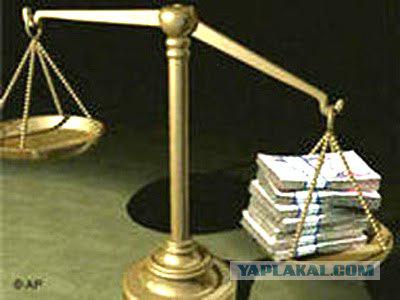
"SP": - But this is not normal, and says, rather, a serious disease of our society than about his well-being and future prosperity, which is so like to talk Kremlin guests ...
- Of course, this is a painful condition of the society, who can not find other ways to normal consolidation, solidarity, trust, cohesion, predictability. But in terms of social disorientation is difficult to expect something different. As for the current president of the future promises a "rich and happy life for all Russians," it is necessary to begin each of us, and he, of course, also with the order to clear the filth of this corrupt your own home. This brings to mind the report of the recently deceased Marina Salie on the activities of then Deputy Mayor Sobchak of St. Petersburg Vladimir Putin in the early 1990s.
"SP": - Some of your colleagues - experts attribute this to the fact that since Vladimir Putin came to power in 2000 the number of officials is growing uncontrollably. Constantly are any additional commissions, divisions and subdivisions. Just do not keep track of all!
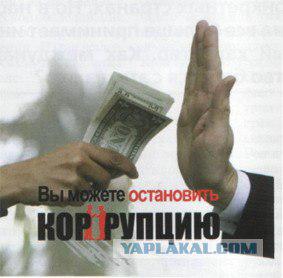
- It is not quite true. In Russia now about 1, 6 million civil state and municipal employees. In 2000, there were 1 city, 16 million people. For comparison, in the US federal officials only 2, 1 million people, and there are state and local government employees. In the US and in France per capita is seven times the officials more than we have in Japan three times, in Norway - in 2, 5 times. Their number is associated with the functions assumed by the state. Therefore it is difficult to say how much or little for the country - a certain amount of bureaucratic people. Another thing - the effectiveness of their work. And here there are problems. Anxiety Russian society against bureaucrats associated primarily with the fact that it does not control them and does not know what exactly is the major industry officials
"SP": - Many people in the country do not even surprised, but only caused sarcasm, when Putin came to power once again, his advisers appointed ministers of health and education. They say the same no small salary, which was with them in the ministry ...
- The trend of employment "their" present, yes. After all, "their" personal existence stabilize our major superiors.
"SP": - What can you say about the relationship "Putin-Medvedev" and "Medvedev-Putin"? From what they (the relationship) area? And that gives the Russian state?
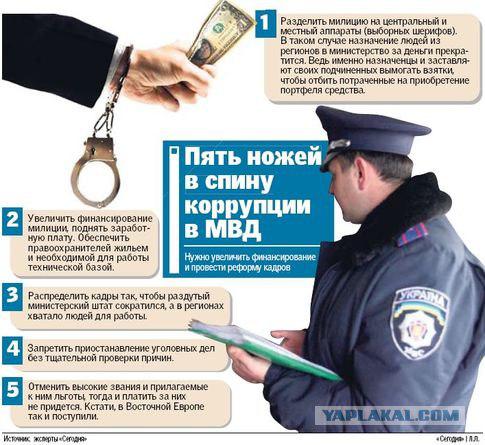
- These relations are essentially clan. Due to this state as a power structure receives a certain stability. The base of it - the monopoly of power and the manipulation of public opinion. This dark period of Russian life. The gloom in this case, I associate with musty social life and difficult viewing the prospect of development of society and the state. Instead, the current external "well-being" in the form of cars every 3-5 th Russians, dachas, regular trips to overseas resorts are tied mainly on exports of hydrocarbons for which kept the price is good. But Russia itself produces almost nothing. Technologically, we are sorely lagging behind. Even the production of food and light industry, we are largely imported, imported. Once at the beginning of his presidential career Putin set the task to catch up with Portugal, significantly increase the GDP. It did not happen. The problem is not only in the unfavorable external economic circumstances. First of all, the inability. So far, the Kremlin has no ideas about what kind of society (apart from the fact that it does not really hurt steer) need to build. It happened that the loyalty of the middle and lower paid elite circles of power, that gave them the opportunity to use public resources for personal purposes. In essence, this partial privatization of the state. At the same time it was, and a certain guarantee of their "loyalty" (after all, in which case it is possible and plant). But all the time needed doglyad. Hence, such a passion for the "manual" control. Certainty vertical power once achieved, but efficiency - no. Resources go, necessarily in performing tasks accurately and on time there, too, no clear course.
"SP": - You used the word "elite". What (and who) is it is in Russia today?
- In his studies, I define it as a social group composed of individuals holding political, economic, administrative management positions that give them the opportunity to significantly influence the allocation of public resources for their own purposes, whether or not to take decisions which have a significant impact on life of the country and citizens. It is important that the failure to take decisions (which, by virtue of their position have to take these people) may also be crucial. The case of the flooding in Krymsk clearly it shows. Organizational present elite even more decentralized than the Soviet. There are many groups, clans, cliques. They are organized on the basis of material, compatriot, regional, national and other interests. In Soviet times, too, were fraternities and clans. For example, close to the General Secretary Brezhnev, Dnepropetrovsk. But then there were certain strict confines of the existence and reproduction of elites. In this sense, often speak of a unified nomenclature to one ideology. Now such nomenclature, no ideological framework. Therefore, different permissible "Liberty." For example, a public statement Kudrin when he was the finance minister of disagreement with the budgetary decisions of the president. This is a demonstration not only of personal differences, differences of ideas about how the policy of the ruling groups.
If we compare this with the information of the "liberals" and "siloviki" in the government, it is possible to conclude that significant inter-group conflicts. This is most clearly manifested in the opposition to the General Prosecutor's Office and the Investigative Committee. According to the latest news concerning the revelations Alexander Bastrykin, the conflict continues.
At regional level, the struggle between the administrative-economic groups around the budget, local resources takes place, usually in the form of a confrontation the governor and legislative assembly, the governor and the mayor of the regional capital, between the factions in regional parliaments. In some cases, intra-elite struggle can carry an armed character. North Caucasus is a glaring example. At the heart of the conflicts, the same struggle for resources, but painting and organizational forms it may have ethnic, religious.
In the modern Russian elite has spread open nepotism. Related clans and groups close to them privatized property and power. The clan Rakhimov of Bashkortostan until recently oversaw significant resources in Tatarstan is Shaimiev and his relatives. Similar processes occur in Mordovia, Chechnya, Russian regions at the federal level. We can say that the phenomenon is becoming widespread. This suggests the importance of the process of formation of the Russian elite as a special social stratum seeks to reproduce itself. Soviet nomenclature was limited to this.
"SP": - According to experts, the elite is largely the product of a society in which "grows».
- The Russian society is in a state of disorientation. Few people now understand that it is true that the moral and why, what you need to focus. And in general, whether legitimate the existing social order. This is due more to the fact that there is no real political process. There is no real political power struggle for seats in the legislature election is not fair and not fair. And what 35 members of the city parliament for Moscow and 50 - Petersburg?
No mutual control and containment of various branches and levels of government. As a result, the bureaucracy seeks (and unsuccessfully) to command the legislators, legal proceedings, and the local government lacks the resources and, in fact, independent. Party Life did not become an important part of Russia's public policy. Demonstrations and rallies are considered in recent years almost as a criminal act. A policy animates just participated in the processions of various population groups, not the administration. State interest, ie, the basis of government policy, subject to the benefit of economic or purely branding. The result is blurred ideology. This is clearly seen by the factions in the State Duma. Not very easy to find now the difference between a large part of the deputies belonging to different factions. Who, for example, the difference between the deputy of the "Fair Russia" by his colleagues from the "United Russia" for their ideological principles? And what are they, these same principles? Yes and within factions and parties, a lot of people with a different outlook. For example, Levich Gudkov from the "Socialist". In "ER" in this regard, even came up with a variety of clubs, platform.
"SP": - We started a conversation with you to the corruption in Petersburg. In general, the current Russian elite is more corrupt than the former, Soviet, or not?
- Annual reports of international research organizations indicate that corruption in our country is growing. Speech by Mikhail Ilyin on the board of Research Affairs in St. Petersburg and Leningrad region is very significant. Similar processes occur in all regions. In Kaliningrad, for example, this year the growth of the identified corruption grew by 27%. Which city, district, region or take in modern Russia, be sure to bump into such facts. And, it seems, to deal with this power is not going to. Otherwise, the St. Petersburg Ilyin would not send sudden leave, and immediately took to the investigation.
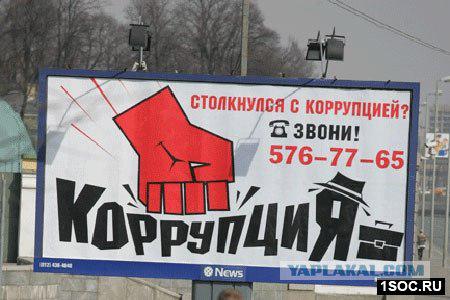
Source:
Budget money goes to the left. And more and more. If even five years ago, corrupt officials stole from the state budget to 50% of public funds, now has assigned 80%. Such data are made public at a recent board of the Main Department of Internal Affairs in St. Petersburg and the Leningrad region Head of economic security and anti-corruption department of the Mikhail Ilyin.
This statement caused a strong reaction in law enforcement. True, not the one on which he could rely.
source

Ilyin was almost immediately suspended from duties. While temporary, with the words "leave of absence". Moreover, it is in this position less than six months. As told "SP" colleagues Ilyin, "all data is correct, tested more than once, just to talk about them was impossible without coordination with Smolny».
In Smolny also responded, but peculiar: tightly disabling for some time, all telephones officials - at least for the press. Attempts by the correspondent of "joint venture" for comment, in particular, the leadership of the Committee on Investments and Strategic Projects and Construction Committee for several days consistently met with a polite but firm "No one!" Secretary of the head of these departments of the city administration. < br />
"Specifically, this figure - 80% named high-ranking law enforcement officer at the beginning, of course, shocking, but actually operated it many known facts - said on this occasion Anatoly Krivenchenko, deputy of the Legislative Assembly of St. Petersburg of the faction" Fair Russia ". - They are just silent. I can give you examples - building the world's most expensive stadium on Krestovsky Island, which was completed in 2009 but has not yet been completed; KAD building another branch. "

With deputy According to experts, complementing the "bribe list" of road maintenance, the organization of mass events and numerous targeted targeted programs.
- Corruption has become systemic, - Alexander Duka, candidate of political sciences, head of the sociology of government and civil society Sociological Institute of Russian Academy of Sciences. - Kickbacks, inflated prices - has long been almost the norm for officials and those who are with them. Without it they can not, because corruption is the fastest and most efficient way to acquire a certain social status and wealth. This - at first. Second, it unites power groups, it is well known: the robbers had a common blood. Third, the joint corruption case creates a special trust between the participants. Fourth, corruption facilitates the relationship between business and government, making them understandable, transparent and predictable. Dal-get-done. All! Also, by the way, between the population on one hand, and government officials, police, doctors, etc. with another. Therefore, it is so firmly established in modern Russia.

"SP": - But this is not normal, and says, rather, a serious disease of our society than about his well-being and future prosperity, which is so like to talk Kremlin guests ...
- Of course, this is a painful condition of the society, who can not find other ways to normal consolidation, solidarity, trust, cohesion, predictability. But in terms of social disorientation is difficult to expect something different. As for the current president of the future promises a "rich and happy life for all Russians," it is necessary to begin each of us, and he, of course, also with the order to clear the filth of this corrupt your own home. This brings to mind the report of the recently deceased Marina Salie on the activities of then Deputy Mayor Sobchak of St. Petersburg Vladimir Putin in the early 1990s.
"SP": - Some of your colleagues - experts attribute this to the fact that since Vladimir Putin came to power in 2000 the number of officials is growing uncontrollably. Constantly are any additional commissions, divisions and subdivisions. Just do not keep track of all!

- It is not quite true. In Russia now about 1, 6 million civil state and municipal employees. In 2000, there were 1 city, 16 million people. For comparison, in the US federal officials only 2, 1 million people, and there are state and local government employees. In the US and in France per capita is seven times the officials more than we have in Japan three times, in Norway - in 2, 5 times. Their number is associated with the functions assumed by the state. Therefore it is difficult to say how much or little for the country - a certain amount of bureaucratic people. Another thing - the effectiveness of their work. And here there are problems. Anxiety Russian society against bureaucrats associated primarily with the fact that it does not control them and does not know what exactly is the major industry officials
"SP": - Many people in the country do not even surprised, but only caused sarcasm, when Putin came to power once again, his advisers appointed ministers of health and education. They say the same no small salary, which was with them in the ministry ...
- The trend of employment "their" present, yes. After all, "their" personal existence stabilize our major superiors.
"SP": - What can you say about the relationship "Putin-Medvedev" and "Medvedev-Putin"? From what they (the relationship) area? And that gives the Russian state?

- These relations are essentially clan. Due to this state as a power structure receives a certain stability. The base of it - the monopoly of power and the manipulation of public opinion. This dark period of Russian life. The gloom in this case, I associate with musty social life and difficult viewing the prospect of development of society and the state. Instead, the current external "well-being" in the form of cars every 3-5 th Russians, dachas, regular trips to overseas resorts are tied mainly on exports of hydrocarbons for which kept the price is good. But Russia itself produces almost nothing. Technologically, we are sorely lagging behind. Even the production of food and light industry, we are largely imported, imported. Once at the beginning of his presidential career Putin set the task to catch up with Portugal, significantly increase the GDP. It did not happen. The problem is not only in the unfavorable external economic circumstances. First of all, the inability. So far, the Kremlin has no ideas about what kind of society (apart from the fact that it does not really hurt steer) need to build. It happened that the loyalty of the middle and lower paid elite circles of power, that gave them the opportunity to use public resources for personal purposes. In essence, this partial privatization of the state. At the same time it was, and a certain guarantee of their "loyalty" (after all, in which case it is possible and plant). But all the time needed doglyad. Hence, such a passion for the "manual" control. Certainty vertical power once achieved, but efficiency - no. Resources go, necessarily in performing tasks accurately and on time there, too, no clear course.
"SP": - You used the word "elite". What (and who) is it is in Russia today?
- In his studies, I define it as a social group composed of individuals holding political, economic, administrative management positions that give them the opportunity to significantly influence the allocation of public resources for their own purposes, whether or not to take decisions which have a significant impact on life of the country and citizens. It is important that the failure to take decisions (which, by virtue of their position have to take these people) may also be crucial. The case of the flooding in Krymsk clearly it shows. Organizational present elite even more decentralized than the Soviet. There are many groups, clans, cliques. They are organized on the basis of material, compatriot, regional, national and other interests. In Soviet times, too, were fraternities and clans. For example, close to the General Secretary Brezhnev, Dnepropetrovsk. But then there were certain strict confines of the existence and reproduction of elites. In this sense, often speak of a unified nomenclature to one ideology. Now such nomenclature, no ideological framework. Therefore, different permissible "Liberty." For example, a public statement Kudrin when he was the finance minister of disagreement with the budgetary decisions of the president. This is a demonstration not only of personal differences, differences of ideas about how the policy of the ruling groups.
If we compare this with the information of the "liberals" and "siloviki" in the government, it is possible to conclude that significant inter-group conflicts. This is most clearly manifested in the opposition to the General Prosecutor's Office and the Investigative Committee. According to the latest news concerning the revelations Alexander Bastrykin, the conflict continues.
At regional level, the struggle between the administrative-economic groups around the budget, local resources takes place, usually in the form of a confrontation the governor and legislative assembly, the governor and the mayor of the regional capital, between the factions in regional parliaments. In some cases, intra-elite struggle can carry an armed character. North Caucasus is a glaring example. At the heart of the conflicts, the same struggle for resources, but painting and organizational forms it may have ethnic, religious.
In the modern Russian elite has spread open nepotism. Related clans and groups close to them privatized property and power. The clan Rakhimov of Bashkortostan until recently oversaw significant resources in Tatarstan is Shaimiev and his relatives. Similar processes occur in Mordovia, Chechnya, Russian regions at the federal level. We can say that the phenomenon is becoming widespread. This suggests the importance of the process of formation of the Russian elite as a special social stratum seeks to reproduce itself. Soviet nomenclature was limited to this.
"SP": - According to experts, the elite is largely the product of a society in which "grows».
- The Russian society is in a state of disorientation. Few people now understand that it is true that the moral and why, what you need to focus. And in general, whether legitimate the existing social order. This is due more to the fact that there is no real political process. There is no real political power struggle for seats in the legislature election is not fair and not fair. And what 35 members of the city parliament for Moscow and 50 - Petersburg?
No mutual control and containment of various branches and levels of government. As a result, the bureaucracy seeks (and unsuccessfully) to command the legislators, legal proceedings, and the local government lacks the resources and, in fact, independent. Party Life did not become an important part of Russia's public policy. Demonstrations and rallies are considered in recent years almost as a criminal act. A policy animates just participated in the processions of various population groups, not the administration. State interest, ie, the basis of government policy, subject to the benefit of economic or purely branding. The result is blurred ideology. This is clearly seen by the factions in the State Duma. Not very easy to find now the difference between a large part of the deputies belonging to different factions. Who, for example, the difference between the deputy of the "Fair Russia" by his colleagues from the "United Russia" for their ideological principles? And what are they, these same principles? Yes and within factions and parties, a lot of people with a different outlook. For example, Levich Gudkov from the "Socialist". In "ER" in this regard, even came up with a variety of clubs, platform.
"SP": - We started a conversation with you to the corruption in Petersburg. In general, the current Russian elite is more corrupt than the former, Soviet, or not?
- Annual reports of international research organizations indicate that corruption in our country is growing. Speech by Mikhail Ilyin on the board of Research Affairs in St. Petersburg and Leningrad region is very significant. Similar processes occur in all regions. In Kaliningrad, for example, this year the growth of the identified corruption grew by 27%. Which city, district, region or take in modern Russia, be sure to bump into such facts. And, it seems, to deal with this power is not going to. Otherwise, the St. Petersburg Ilyin would not send sudden leave, and immediately took to the investigation.

Source:




